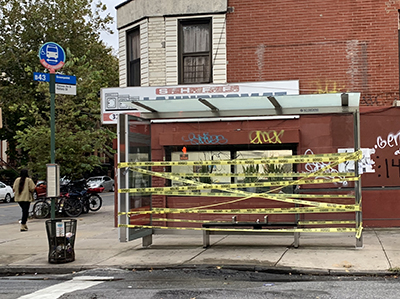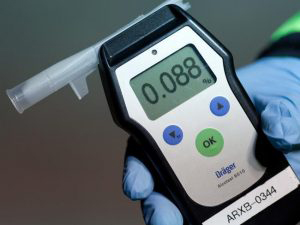Blog
GUEST VOICES: Time for Opioid Makers to Pay Their Share
- Details
- Created: Friday, May 10 2019 16:24
by Ramon Castellblanch, Ph.D., President, Quality Healthcare Concepts, Inc.
With AB 1468 (McCarty), opioid manufacturers and distributors will begin to pay California to help stop the deaths and misery caused by the opioid epidemic, off of which these businesses have so highly profited. For two decades, opioid manufacturers and distributors have irresponsibly promoted opioids. Opioid-makers like the Sackler family-owned Purdue Pharma have pleaded guilty to misleading regulators, doctors and patients about their opioid Oxycontin’s risk of addiction and its potential to be abused. Opioid distributors like Cardinal Health and AmerisourceBergen have settled lawsuits that they were shipping opioids to “pill mill” pharmacies that dispense excessive numbers of painkillers.
New York City Bans Booze Ads
- Details
- Created: Friday, May 10 2019 15:36
 In a surprising but much-needed executive order, New York City mayor Bill de Blasio banned alcohol advertisements on city-owned property. Following on the heels of the city’s decision to remove booze ads from public transit (including buses and subway trains), the new order does the same to bus shelters, newsstands, and other street properties.
In a surprising but much-needed executive order, New York City mayor Bill de Blasio banned alcohol advertisements on city-owned property. Following on the heels of the city’s decision to remove booze ads from public transit (including buses and subway trains), the new order does the same to bus shelters, newsstands, and other street properties.
“What underpins this order is a close review of the science,” Dr. Hillary Kunins, Acting Executive Deputy Health Commissioner for the city of New York, told the New York Times. “The major studies show that exposure to alcohol advertising influences drinking, particularly in youth.”
The Times reports a high level of alcohol harm in New York City, citing 2,000 alcohol-related deaths and 110,000 emergency room visits yearly. This chronic source of death, injury, and lost productivity has a cost that may equal or exceed the revenue lost from the ad ban.
New York City is not the first major American city to make this calculation. Similar outdoor advertising bans have gone into effect in Philadelphia, San Francisco, and Los Angeles, the latter two with the involvement of Alcohol Justice and the Los Angeles Drug and Alcohol Policy Alliance.
“We commend Mayor de Blasio for taking strong action to protect residents of New York,” said Jorge Castillo, Advocacy Director at Alcohol Justice. “Outdoor ads are a blight that takes vulnerable lives. We need lawmakers in every city to stand up and take on Big Alcohol.”
READ MORE about getting rid of outdoor alcohol advertising.
READ MORE about the fight for an alcohol ad-free Los Angeles.
Point .05 BAC Bills Stall
- Details
- Created: Friday, May 10 2019 15:20
Influential advocacy groups MADD and Advocates for Highway and Auto Safety enter the fight.
 Bills in California and Oregon to lower the blood alcohol content (BAC) limit for driving under the influence (DUI) to 0.05% have stalled in the legislature. A similar bill in Michigan is still being deliberated. More encouragingly, the advocacy and public safety groups pushing for this life-saving limit have been joined by Mothers Against Drunk Driving (MADD), one of the strongest anti-DUI voices in the country, and the D.C.-based Advocates for Highway and Auto Safety, promising these issues will not go away quietly.
Bills in California and Oregon to lower the blood alcohol content (BAC) limit for driving under the influence (DUI) to 0.05% have stalled in the legislature. A similar bill in Michigan is still being deliberated. More encouragingly, the advocacy and public safety groups pushing for this life-saving limit have been joined by Mothers Against Drunk Driving (MADD), one of the strongest anti-DUI voices in the country, and the D.C.-based Advocates for Highway and Auto Safety, promising these issues will not go away quietly.
Under the guidance of the Liam’s Life foundation, California State Senator Jerry Hill and Assembly Member Autumn Burke introduced AB 1713, a 0.05% BAC bill. However, that bill has failed to advance from committee, leaving it on ice at least until next year. Likewise, Oregon Senate Bill 7, introduced by Senate President Peter Courtney, will not move forward despite vocal support from the governor.
“These legislatures need to get their priorities in order,” said Michael Scippa, Public Affairs Director of Alcohol Justice. “Lower BAC limits are evidence-based and popular. Simply put, point 05 saves lives.”
Efforts to lower the DUI threshold have been evidence-tested throughout the developed world. As of 2015, 34 countries had BAC limits of 0.05% or less, including Australia, France, Germany, and Italy. All in all, 2.1 billion people live in countries with the lower DUI threshold, making the U.S. an exception with its 0.08% standard. That exception may be coming to an end, however. Already, the state of Utah has lowered its threshold for DUI to 0.05%, and in recent years, Washington, New York, and Hawaii have joined California, Oregon, and Michigan in considering a similar limit.
The law represents a simple and direct way to prevent alcohol-related deaths. Researchers estimate that a nationally adopted 0.05% BAC level for DUI would save 1,800 lives annually. The life-saving benefits do not simply accrue because of more arrests. Researchers looking at lowered BAC limits in other countries noticed a drop in fatalities at all BAC levels, not just between 0.05% and 0.08%. This suggests that, regardless of police action, drivers see the lower limit as a cue to not drive after drinking.
Recognizing the power of policies promoting the 0.05% BAC, MADD threw its support behind the California and Michigan efforts. “We want to do everything we can to stop these tragedies [of impaired driving deaths],” said MADD National Board Member Carol Leister in a prepared statement. “That’s why MADD made the decision this year to support any state that seeks to lower the BAC threshold to 0.05.”
Advocates for Highway and Auto Safety, meanwhile, placed a blistering op-ed in the Washington Times, criticizing industry complaints that lower BAC limits are unfair or mistargeted. "Measurable change comes from effective leadership implementing data-driven, research-backed countermeasures such as .05 percent blood alcohol concentration policy," the authors write. "Progress in the fight against drunk driving has been stalled for decades, and new, proven solutions are urgently needed."
MADD has also supported another bill from Sen. Hill of California, SB 545, strengthening the requirements that convicted DUI offenders install ignition interlock devices. Leister declared the law was “long overdue in California.” That bill is currently in front of the senate Appropriations Committee.
READ MORE about Liam’s Law and the fight for Point 05 in California
READ MORE about how Point 05 Saves Lives
More Articles ...
Subcategories
Help us hold Big Alcohol accountable for the harm its products cause.
| GET ACTION ALERTS AND eNEWS |
STAY CONNECTED    |
CONTACT US 24 Belvedere St. San Rafael, CA 94901 415-456-5692 |
SUPPORT US Terms of Service & Privacy Policy |


